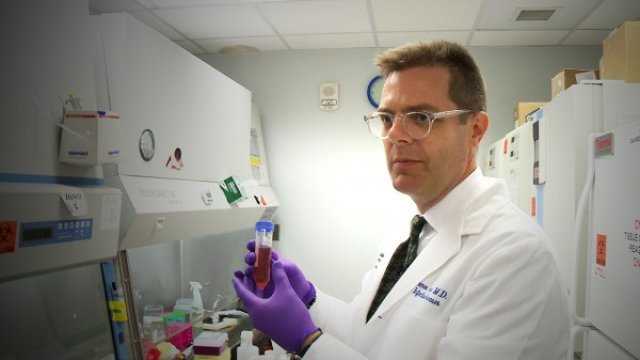Researchers found Zika virus neutralizing antibody

Vanderbilt University Medical Center
Researchers from the Vanderbilt University Medical Center and the University of Washington Medical School in St. Louis isolated human monoclonal antibodies that significantly reduced the Zika virus infection in mice.
ZIKV-177 antibodies were also able to protect the fetus of pregnant mice infected with Zika virus. Similar tests were performed to protect the young primates, and the positive effect was also successfully confirmed. Scientists note that if they manage to continue to work on ZIKV-177, then with its help they will be able to protect pregnant women who are at risk of infection with Zika virus. In addition, research results can help develop an effective vaccine. So says Dr. James Crow, Jr., director of the Vanderbilt Vaccination Center, one of the authors of the scientific work.
')
Zika virus causes microcephaly - a reduction in the size of the skull and other congenital malformations in children born to patients with Zika virus or HIV-infected mothers. It can be transmitted sexually from infected men to its partner, and then from an infected pregnant woman to the fetus through the placenta. In most cases (about 80%), the disease is asymptomatic, so it is quite difficult to accurately estimate the number of patients. The first signs of the disease are headache, fever, pain in the joints and a rash, which usually manifests itself on the face, and then spreads throughout the body. In about one in five cases, Zika virus can develop into Zika fever, the main symptoms of which are fever and rash. Another difficulty in the diagnosis of the disease lies in the fact that all these symptoms also occur during infection with other viruses of the genus Flavivirus, which include Zika disease.
For the past 15 years, Crowe and his colleagues have been working on producing human monoclonal antibodies that can neutralize a wide range of viruses, from Ebola to HIV. Antibodies are compounds of the blood plasma compound, also called immunoglobulins. When a virus enters the body of a human or other mammal, immunoglobulins are produced. They bind to the active centers of the virus and neutralize them. Monoclonal antibodies are produced by human immune cells and are derived from a single plasma precursor cell, B lymphocyte. This type of white blood cells was connected to myeloma (cancer) cells, which formed a fast-growing “hybrid”. Due to the high rate of development, researchers can quickly generate large quantities of immunoglobulins against specific viruses. In this study, antibodies were isolated from the blood of people who had previously been infected with Zika fever in different countries of the world. Immunoglobulins responded to the shell as a whole or the E protein on the surface of the virus.
Then the scientists tried to generate different types of monoclonal antibodies. In cell culture studies, they identified one, ZIKV-177, which neutralized a wide range of several different virus strains. Among infected mice, antibody injection markedly reduced morbidity and mortality, as well as the risk of mother-to-fetus HIV transmission.
These natural immunoglobulins produced by the human body were the first medical intervention capable of preventing Zika virus infection and damage to the fetus. “The potential and breadth of inhibition of ZIKV-177 looks promising, because the antibody was able to stop the infection with strains from America and Africa, and prevent cell deformation in animals even during pregnancy,” says University of Washington Michael Diamond.
Zika fever has become a global public health threat. In addition to congenital defects, virus strains are associated with the occurrence of Guillain-Barré syndrome - a neurological disorder that causes paralysis and can lead to death. The largest outbreak of this disease in history occurred last year in Brazil. Virus infections transmitted by mosquitoes of the genus Aedes were reported throughout Africa, Asia, the Pacific, and North and South America by the beginning of February 2016. In January, the World Health Organization announced that by the end of this year it would cover most of North and South America. In February, the first case of infection in Russia was also registered. The media reported that the Russian woman contracted Zika virus while on holiday in the Dominican Republic. Russian doctors have assured that in the first phase the disease is easily treatable and that there is no risk of infecting someone else.
To date, there is no cure for Zika virus, as well as its prevention. However, scientists are actively developing a vaccine. In the summer, scientists presented two types of vaccines: one was developed based on the DNA of the virus, and the other contained inactive particles. Both triggered the production of antibodies in infected animals, and the one that was made on the basis of DNA was approved for human testing. Two companies - Inovio Pharmaceuticals Inc. and GeneOne Life Science Inc. have already received permission to test the vaccine.
Scientific work published in the journal Nature November 7, 2016
DOI: 10.1038 / nature20564
Source: https://habr.com/ru/post/398979/
All Articles